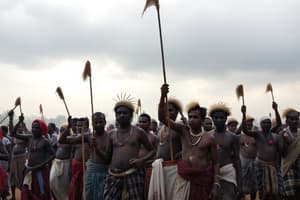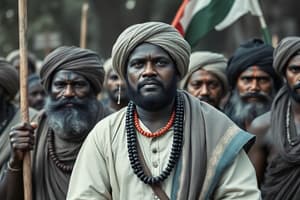Podcast
Questions and Answers
What problems did Birsa set out to resolve?
What problems did Birsa set out to resolve?
Birsa set out to resolve the problems faced by the tribal people, including the disappearance of familiar ways of life, threats to livelihoods, and the perceived endangerment of their religion under British rule.
What was happening to the tribal people under the British? How did their lives change?
What was happening to the tribal people under the British? How did their lives change?
The tribal people were experiencing the disappearance of their familiar ways of life, threats to their livelihoods, and the perceived endangerment of their religion under British rule. Their lives were changing due to these disruptions and impositions by the British and other non-tribal groups.
Who were the outsiders being referred to as dikus, and how did they enslave the people of the region?
Who were the outsiders being referred to as dikus, and how did they enslave the people of the region?
The outsiders referred to as dikus were the British and other non-tribal groups. They were seen as enslaving the tribal people by imposing changes that threatened their traditional ways of life, livelihoods, and religion.
What was the significance of Birsa's followers including other tribals of the region, such as Santhals and Oraons?
What was the significance of Birsa's followers including other tribals of the region, such as Santhals and Oraons?
What were some distinguishing characteristics of tribal societies compared to caste societies mentioned in the text?
What were some distinguishing characteristics of tribal societies compared to caste societies mentioned in the text?
Flashcards are hidden until you start studying
Study Notes
Birsa's Mission
- Birsa Munda aimed to address the exploitation and injustices faced by tribal communities under British colonial rule.
- He sought to restore the land rights of tribal people and oppose the encroachment by outsiders.
Impact of British Rule on Tribal People
- Under British rule, tribal populations experienced significant loss of land and livelihood due to forced labor and land revenue systems.
- Traditional customs and ways of life were disrupted, leading to displacement and economic hardship.
- Tribe members became dependent on the British for work, diminishing their autonomy and cultural identity.
The Dikus and Their Enslavement Tactics
- Dikus referred to outsiders, particularly non-tribal settlers and moneylenders, who exploited tribal resources and labor.
- They imposed heavy debts and unfair trade practices, leading to a cycle of poverty and dependence among tribal communities.
- Land grab tactics by dikus resulted in the displacement of tribal families, forcing them into exploitation and servitude.
Unity Among Birsa's Followers
- Birsa's movement attracted various tribal groups, including the Santhals and Oraons, fostering a sense of unity against common oppressors.
- This coalition strengthened their resistance against colonial exploitation and helped to raise awareness about their rights and struggles.
Characteristics of Tribal vs. Caste Societies
- Tribal societies typically emphasize egalitarian structures with collective decision-making, contrasting with the hierarchical nature of caste systems.
- Social organization in tribal communities is often based on kinship and community ties rather than rigid caste identities.
- Cultural practices in tribal societies are more fluid and adaptable, while caste societies have prescribed roles and expectations that dictate behavior and social standing.
Studying That Suits You
Use AI to generate personalized quizzes and flashcards to suit your learning preferences.




